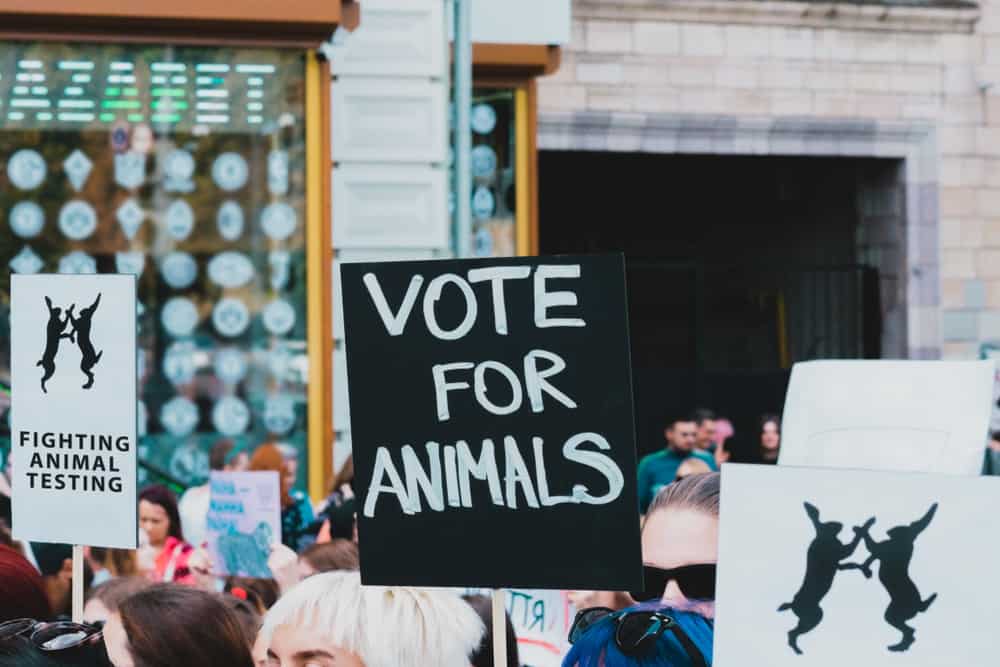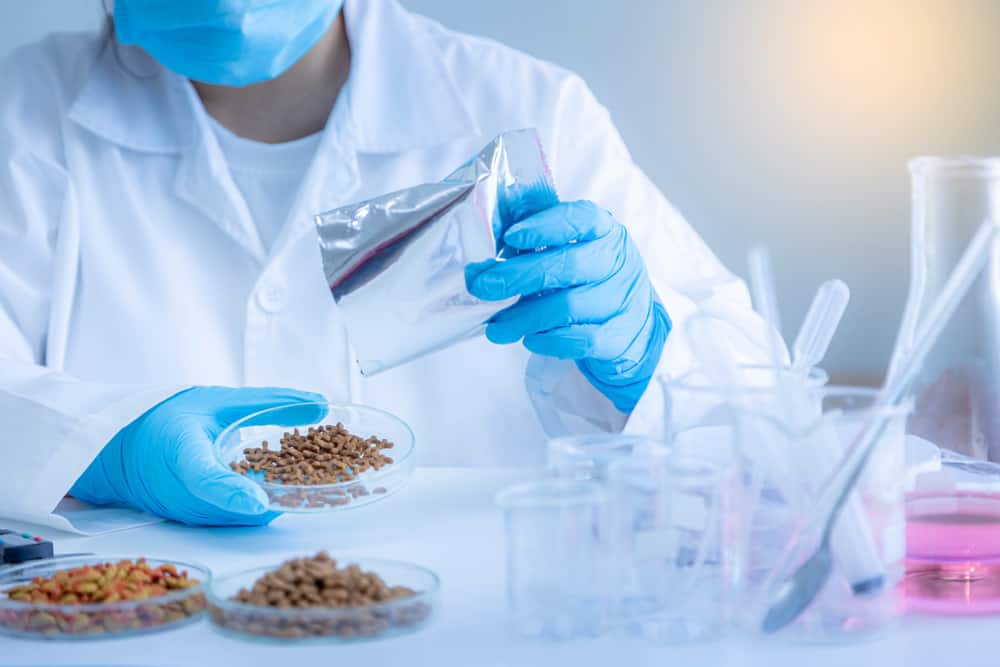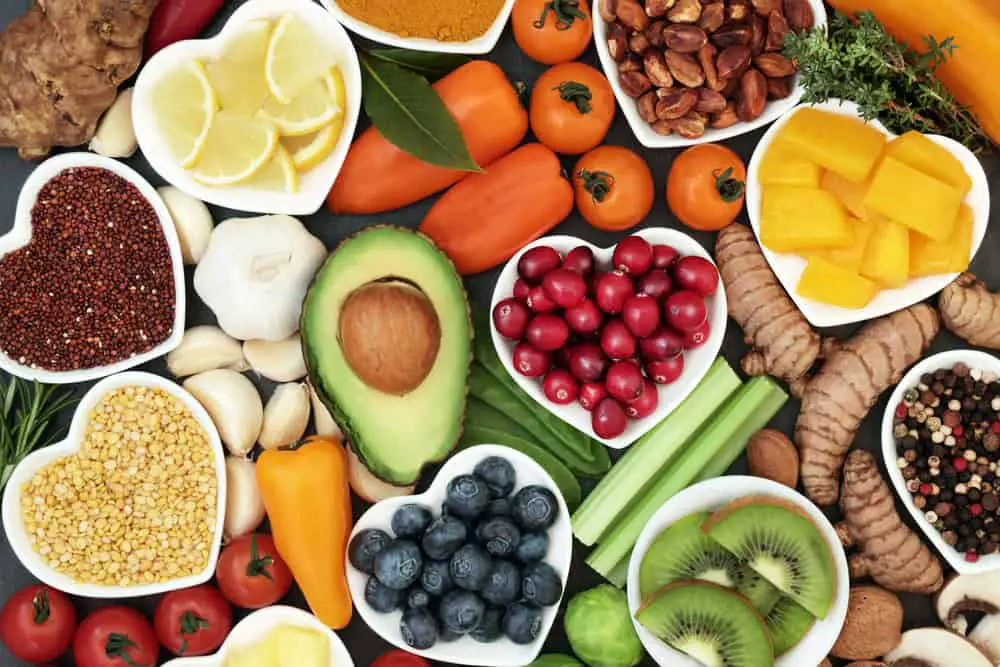Many foods that we eat daily are tested on animals. Sometimes, testing involves purposely causing suffering and other times, it’s to study the effects of food or supplements on animal’s bodies.
Companies use animals for testing to prevent adverse side effects on humans. But how far do they take this controversial practice?
Various food items tested on animals every day include sweeteners, supplements, teas, pet food, food coloring, and candy. These animal tests are used to analyze the effects that food or ingredients have on the animal and to gather data.
The argument behind testing food products on animals is that it allows companies to identify what is safe for people to consume.
You might not be comfortable knowing the products you consume are tested on animals in a cruel and inhumane way? Read on to learn more about what foods are tested on animals.
Foods That Are Tested on Animals
Companies spend a lot of money researching their products and the effects on people and animals. In most cases, products are tested on animals to analyze how they affect their bodies’ various systems. These tests let the researchers know what changes to make in their formula to avoid negative human effects.
Sometimes testing is done in-house. However, animal testing is usually carried out at a third-party laboratory or other facilities where the animals are treated inhumanely and have poor living conditions.
Many animals are killed during the testing of products.
Brands that produce food products are often the same as those producing makeup, cleaning products, and chemicals. These brands:
Popular Food Brands That Test on Animals
Some of the most popular food that we eat has been tested on animals to promote health claims or ensure that it is safe for human consumption. However, many brands cause unnecessary suffering on the animals that are tested on.
Nestle
Nestle is a leading brand of food and drink products. Nestle believes that animal testing is necessary to ensure that their products are safe for their consumers at the price of hurting animals.
Injecting mice with acid to see the benefits of goji berry supplements does not seem necessary and is cruel.
Nestle owns Kit-Kats, Hot Pockets, Gerber, Coffee Mate, and many other products. Nestle has been known for shady business practices throughout their brands.
Mars
Mars Wrigley is a company that produces some of the most popular candy products in the world. Mars carries out animal testing on their products. They produce popular candy such as:
Splenda
Splenda is a popular artificial sweetener that has a horrible history of animal cruelty. Artificial sweeteners are also linked to cancer in humans.
Artificial Sweetener
To study the effects of the sweetener, scientists performed various cruel experiments. There are over 12,000 animal deaths related to testing artificial sweeteners on animals.
Other animals were also force-fed sweeteners to see the effects that it had. These studies involved either starving the animals or force-feeding them the sweeteners. Some of these animals suffered from brain damage, others from other painful deaths.
If you want to use an artificial sweetener, go with Sweet N Low instead of Equal or Splenda. Sweet N Low is an artificial sweetener, but it was not tested on animals making it a good cruelty-free option.
However, you should still be concerned with the possible adverse health effects of artificial sweeteners.
Danone
Danone is a major producer of spring water, dairy, and plant-based dairy substitutes. They believe that animal testing is essential when developing products to keep people safe.
Danone also funds animal testing for baby formula. Scientists surgically inserted test tubes into baby piglets’ intestines to see how easy the formula was to digest for human babies.
It is widely known that pigs and humans share many characteristics. For this reason, pigs are often tested in place of human subjects.
Pigs are one of the most intelligent mammals, next to humans. This makes the testing all the crueler.
Activism Against Animal Testing
Organizations have been fighting for years to stop the cruel practice of animal testing on products. Some companies have decided to end animal testing in recent years, which is a big win for animal activists.
Companies who once tested on animals but no longer do include:
Many companies are stopping animal testing for their products after much public outcry about the ethical treatment of animals. They are looking towards cruelty-free testing alternatives.
However, many companies still use animal testing when developing their products. It is hard to imagine that eating a Snickers promotes animal cruelty, but it is a sad truth. Animal testing is also used in popular pet food brands.
Popular Pet Food Brands That Use Animal Testing
You may not be surprised to find out that companies also test pet food on animals to analyze its effects on animal bodies. The food that you feed your dog or cat might have been tested on different animals in a lab. Some companies are more extreme than others.
Many larger food companies also include pet food products. Companies mentioned above, like Nestle, manufacture foods for both human and animal consumption. The cruel animal testing practices they completed for human food and products carried over to their pet food labels.
Brands That Use Invasive Feeding Trials
For companies to state that their pet food provides a balanced diet, they have to ensure the foods meet specific criteria.
To make claims such as their pet food promotes healthy coats or is designed to promote joint health in older animals, brands conduct feeding trials to meet the Association of American Feed Control Officials guidelines.
Hill’s takes transparency to the next level by offering tours of their facilities and states that they try everything in their power to prevent animal suffering.
However, some companies have pledged to be cruelty-free. Cruelty-free pet food is the way to go if you care about animals’ well-being since they do not conduct invasive testing or experiments on their animals.
The Dark Truth About Animal Testing on Foods
Food testing is often very painful to the animals, and companies cause unnecessary suffering to the animals. Animal testing is no longer necessary. With the advances that we have in technology, we could use computers instead of animals.
When animals are tested in a laboratory, they are generally tortured or killed in analyzing the effects of the food products they are consuming. Not all tests are to this extreme, but many are inhumane. Many animals are stuck in small cages.
What Is Happening in the Laboratories?
Due to the standards set by the FDA and other agencies, some companies feel that it is necessary to conduct experiments on animals. However, there are cruelty-free options that could be taken. A scientist could use a computer instead of an animal.
Animals in labs are observed for a period of time to see if products will be harmful to people before human testing. One of the biggest things that these labs are testing for is the toxicity of the ingredients. The scientists want to know what will make people sick.
Mars is known for doing some of the most brutal testing on animals for their products. Mars funded the testing of the effects of chocolate on the blood vessels of rats. After forcing the rats to eat the chocolate, they opened up the arteries on the rats’ legs.
The company also performed other experiments that were similar to the chocolate experiment. These experiments are ruthless for wanting to test the effects of candy on lab rats and mice.
Better Options
There are better options that companies can now use that were not available when the animal test was the standard process for developing foods, drugs, and other products. With the advance in technology comes the ability to look at things at the molecular level.
With the technology of today, scientists can test ingredients on human or animal cells.
There are also alternative methods that could be used to test pet food. The Association of American Feed Control Officials (AAFCO) and FDA have requirements for producing pet food. They ensure that food is safe for pets to eat at home.
However, a company does not need to perform cruel testing on animals to ensure that it is healthy for pets. Many companies have already adopted a cruelty-free process to ensure that their food does not cause harm to animals.
Cruelty-Free Food Options
Now that you know of all the cruel experiments that animals are put through to get food on your table, you can become a responsible consumer. There are a couple of options that you can choose between to prevent animal suffering.
Popular choices include switching your diet and lifestyle.
A surefire method would be to switch your diet to become vegan or vegetarian. However, there are some options that you could choose that will allow you to eat meat with the minimal amount of animal suffering possible.
Becoming Vegetarian or Vegan
After knowing what companies do to animals, you are probably ready for a cruelty-free option for your food. But, what are the options to choose from? Vegan is the best option if you don’t want any animals to suffer at your expense.
You may have thought that you are eating cruelty-free by being a vegetarian. Still, plenty of non-meat products such as artificial sweeteners, candy, and dairy products could treat animals inhumanely. You have to check out each brand to ensure that you are doing your part.
Here's what you need to know: Are Vegetarian Products Cruelty-Free?
Becoming vegan or vegetarian may not seem enticing to you. However, there are some options that you can choose from to ensure that your food to include meat and dairy, come from cruelty-free sources. Free-range eggs would be an example of cruelty-free produce.
There have been exciting developments in recent years for those who want to have meat alternatives, such as Beyond Meat, which has a similar taste and consistency of meat but is entirely plant based. This might be the best time to make the switch.
Shopping Options
You could pick some options when you are shopping for groceries to ensure that your food is cruelty-free. You could make sure that you buy from humane farmers that have transparent practices and take pride in taking care of their animals.
Examples of cruelty-free products include free-range and cage-free eggs and other products that encourage animals’ natural lifestyles. Anything vegan would also be a great option, such as Beyond or Impossible meat.
What Are the Certifications?
When you are shopping for animal products such as eggs or meat, farmers can obtain a few certifications to prove that they are taking a humane approach to take care of their animals.
You can be comfortable with buying from a brand with the following certifications:
And the third-party guarantee labels don’t stop at food – they apply to many things like clothes and cosmetics. If you want to buy cruelty-free products, this article is a must-read: Which Cruelty-Free Logos Can You Trust in 2021?
Choose Cruelty-Free Pet Food
The same basic concepts with choosing cruelty-free food apply to pet food and some other things to consider. There are requirements that AAFCO and FDA have to ensure pet food is safe to consume.
The best thing to look for is transparency from the company and a good track record of treating animals humanely. With current technology, it is possible to test pet food under a microscope rather than test animals.
Conclusion
There is a lot that goes into the production of food products. Many steps are taken between the drawing table and your plate. Food must be tested to ensure that it is safe for consumption.
Some companies feel that the best way to test products before human trials is to test the products on animals. Scientists perform cruel experiments on animals to analyze the effects of their products on their bodies. Many times the animal testing leads to suffering and death.
Responsible consumers would look for products known to be cruelty-free and verified to practice humane practices with their animals. Look for a certification from the AWA, CH, or the GAP. However, the best option would be to switch to veganism or vegetarianism.



